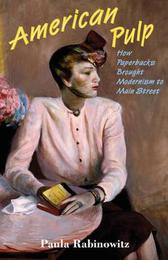
|
American Pulp: How Paperbacks Brought Modernism to Main Street
Paperback / softback
Main Details
| Title |
American Pulp: How Paperbacks Brought Modernism to Main Street
|
| Authors and Contributors |
By (author) Paula Rabinowitz
|
| Physical Properties |
| Format:Paperback / softback | | Pages:408 | | Dimensions(mm): Height 203,Width 127 |
|
| Category/Genre | Literary theory
Literary studies - general |
|---|
| ISBN/Barcode |
9780691173382
|
| Classifications | Dewey:810.9005 |
|---|
| Audience | | Undergraduate | | Postgraduate, Research & Scholarly | |
|---|
| Illustrations |
24 color illus. 42 halftones.
|
|
Publishing Details |
| Publisher |
Princeton University Press
|
| Imprint |
Princeton University Press
|
| Publication Date |
6 September 2016 |
| Publication Country |
United States
|
Description
"There is real hope for a culture that makes it as easy to buy a book as it does a pack of cigarettes."--a civic leader quoted in a New American Library ad (1951) American Pulp tells the story of the midcentury golden age of pulp paperbacks and how they brought modernism to Main Street, democratized literature and ideas, spurred social mobility, a
Author Biography
Paula Rabinowitz is professor of English at the University of Minnesota. She is the author of Black & White & Noir: America's Pulp Modernism.
ReviewsWinner of the 2015 SHARP DeLong Book History Book Prize, The Society for the History of Authorship, Reading and Publishing "ively... Rabinowitz is on to something."--Louis Menand, New Yorker "Rabinowitz's work is a prime example of literary scholarship and essential key to the history of American publishing."--Publishers Weekly "Rabinowitz makes a persuasive case for the role of pulp in widening the landscape of Americans' experience... An ardent collector of pulp fiction, Rabinowitz brings to this scholarly study a passion for the genre and an authoritative analysis of its meaning in American culture."--Kirkus Reviews "[Rabinowitz] writes with briskness and acuity. The historical richness of the material is leavened by a lively, broadminded, and humane sense of her culture. But most important, she writes with affection for the profound effects of her subject."--Ron Slate, On the Seawall "Alluring topics and insightful writing make this a book that should appeal to anyone interested in how reading--and books--change us."--David Keymer, Library Journal "Offers a thoughtful, provocative take on pulp and its influence on American culture, in art, in film--and how the dime-store publications provided new platforms for gay, lesbian, and African American writers, too."--Steven Rea, Philadelphia Inquirer "Paula Rabinowitz has written a fascinating book with much in it to interest anyone curious about aspects of publishing in the 1940s and 1950s. It has a striking cover, ample notes, and some fascinating illustrations."--Jim Burns, Northern Review of Books "Unfailingly fascinating."--Greil Marcus, Barnes and Noble Review "Paula Rabinowitz's exquisite and startling new book about the 'golden age' of U.S. pulp publishing, from the late 1930s to the early 1960s, is rightly confident in the originality of its enterprise. Gorgeously illustrated, American Pulp audaciously sets in motion at least a half-dozen crisscrossing storylines to create a new cartography of pulp performance."--Alan Wald, International Viewpoint "Rabinowitz's snappily titled and alluringly packaged history of the paperback is entertaining...Covering thirty years of pulp history, it places the humble pocketbook in a new light."--Giulia Miller, Times Literary Supplement "Enthusiastic and informative."--Wendy Smith, Daily Beast "This intimate relationship to pulp as object can be traced throughout the book; it seems like a work born of passion, the result of a decade-long love affair with a disposable medium meant to be consumed and thrown away. Yet it is not only the object--and its use by publishing houses, writers, and artists--that she explores, but also the complex and diverse interfaces with the reader, both individual and collective consumers of the pulp book... An overall enjoyable experience."--Vera Benczik, Hungarian Journal of English and American Studies "[Rabinowitz's] impeccably researched and passionately written book is an important contribution to the scholarly work on the histories of modernism and 20th-century publishing, and a demonstration of the political possibilities of popular forms."--Sean Cashbaugh, Science & Society "Rabinowitz' scholarship on the subject of pulp is exceptional, often brazenly creative in her ability to conflate cultural events and cultural moods behind what should have been the quickly forgotten history of pulp."--Alex P. Grover, Publishing Research Quarterly
|